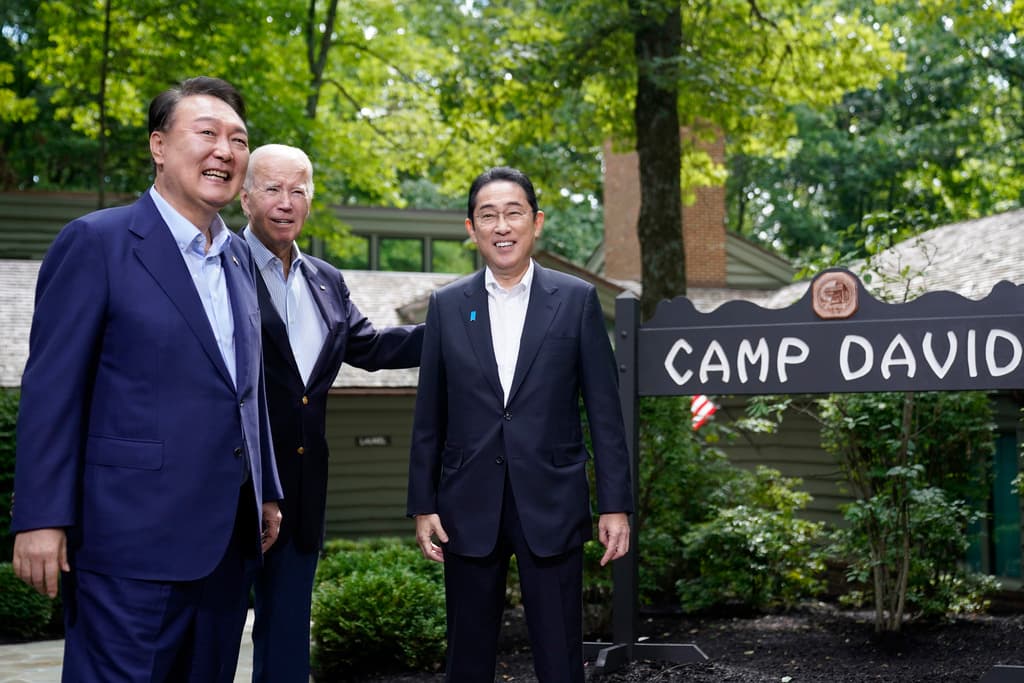South Korea and Japan, Major U.S. Allies, Try To Wriggle Out of Taking a Stand on Gaza
Japan’s foreign minister even asked the foreign minister of Iran, with whom Japan maintains friendly relations, to ‘work on Hamas.’

Two key American allies in East Asia, so eager to cement close ties at the Camp David summit hosted by President Biden two months ago, are engaging in a diplomatic dance to avoid taking a stand on the war in Gaza.
South Korea’s foreign minister, Park Jin, put off Israel’s ambassador, Akiva Tor, in a meeting Friday by offering a skillfully crafted response that stopped short of the slightest hint of blaming either Hamas or Israel for the bloodshed.
Instead, the foreign ministry put its blandest face on the diplomatic dilemma, beginning by noting that Mr. Park “extended condolences to the victims of the Israel-Hamas armed conflict and their bereaved families.”
From there, in an exercise in bothsides-ism, Mr. Park “hoped that the situation will de-escalate as soon as possible and that no more lives will be lost.” And, yes, “the relevant parties need to take measures to protect civilians.”
South Korea’s position appears to have grown more ambivalent since New York’s Senator Schumer led a delegation here after the Hamas onslaught on Israel nearly two weeks ago.
President Yoon did not hesitate then to join the senators at that time in blasting what they agreed was an “indiscriminate attack” by Hamas. Together, they said, the two allies would “play a constructive role to ensure regional tensions ease and stability is achieved through a swift end to the current situation.”
Japan has been, if anything, even more reluctant than South Korea to take a stand. Incredibly, Japan’s foreign minister, Yoko Kamikawa, appealed to Iran to help bring about an end to the conflict.
In a 20-minute phone conversation on Tuesday with Iran’s foreign minister, Hossein Amir Abdollahian, Ms. Kamikawa urged Iran to “work on Hamas and play a role in calming the situation,” said Japan’s Kyodo news agency. In a bow to even-handedness, however, she also condemned “terror attacks by Hamas, to which Iran supplies arms, including rockets for bombarding Israel.
Kyodo had a simple explanation for Japan’s ambivalence: “Stability in the Middle East is important for Japan, which is highly dependent on crude oil imports from the region. Japan is also a close U.S. ally but has traditionally maintained friendly ties with Iran, Israel’s longtime enemy.”
Ms. Kamikawa will bring her quest for peace in Gaza to a conference at Cairo this weekend at which “she is expected to explain Japan’s eagerness to improve the humanitarian situation in the Middle East,” the Japan Times reported. The conference, called by Egypt’s president, Abdel Fattah el-Sisi, “will seek to address the worsening humanitarian crisis” in Gaza.
Korea and Japan, while modulating their comments, are both offering “humanitarian assistance” — $2 million from Korea, $10 million from Japan. The funds — a pittance compared to what they pay Middle Eastern countries for the oil that powers their economies — is to be dispensed through international institutions.
Diplomatic sources in Seoul argued, however, that Korea’s stance should not be compared with that of China, which is leaning ever closer to Hamas after an initial show of neutrality. Both of South Korea’s major political parties have come out with statements strongly condemning Hamas.
China’s Global Times, a voice of official Chinese policy, blasted Washington’s veto on Wednesday of a draft resolution in the UN Security Council calling for a hiatus in hostilities while aid was delivered to Gaza’s 2.3 million people, who are running short of food and water as a result of Israel’s blockade.
The veto reflected “the deep-rooted disregard of the US for the humanitarian disaster in Gaza,” said Global Times. “The US, which often talks about human rights, reveals its true face when it comes to the urgent moment when a large number of civilians’ right to life is trampled upon.”
As of Friday, Egypt, the U.S., and the U.N. were still haggling over details about how to get aid into Gaza via its southern border with Egypt without its benefiting Hamas.

